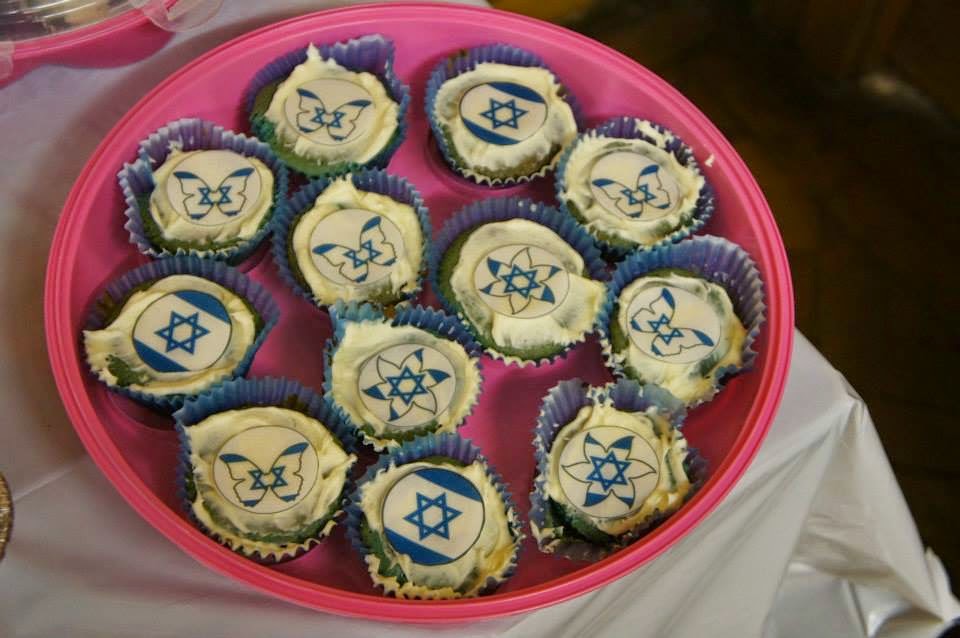Thanks and Sh'choyach to our congregant Roy Saatchi for the following fascinating piece, and to Danny Franks, treasurer and photographer, for capturing the communal seder.
I’ve been in Jerusalem at Pesach and also at Easter, so
I started looking up links between the two and realised that the Passover is
for every one of us. I should add that
this is not a piece of academic study!
Unlike the fabricated juxtaposition of Hanukkah and Christmas,
the overlapping of Passover and Easter displays a common background and equal significance
for observers.
Pesach (or Passover) comes from the Aramaic word Pascha.
I recall from French at school that the
word for Easter is Pacques. Church Latin and Greek for Easter are also
similar to Pascha. Pascha is also an Easter
dish served in several Slavic countries.
So Pascha means both the Jewish holydays of Passover
and the Christian holydays of Easter.
They are both linked to Spring and rebirth. The renewal
of nature that comes with spring strengthens the promise of redemption embedded
in the historical events we are commemorating.
The tradition of giving eggs at Easter
celebrates new life. In antiquity,
nomadic Semitic tribes celebrated Pascha in connection with the spring calving.
A custom developed of preparing unleavened, flat bread (matzah) from the first
harvested grain. It was not until much
later that Pascha came to be celebrated in memory of the exodus of the Jews
from Egypt. And later still, Pesach for us was linked with the coming of the
Mashiach - the messiah. Which is why at
the final moment of every Passover Seder, the Jewish diaspora voice the reflective
hope: “Next year in Jerusalem.” It is
the aspiration toward an ideal, a profound wish that the next year will be a
happy one, just as the Children of Israel hoped after leaving Egypt.

Similarly, Jesus took elements of the Passover (the
unleavened bread and the cup) and Paul in Corinthians directs that as often as
the bread is eaten and the wine drunk, Christians proclaim the death of Jesus
until the Messiah comes again. So for
both of us, it’s a question of here and now and not fully yet there.
Originally, the Jewish and Christian Pasches coincided.
However, in A.D. 325, the First Council of Nicaea determined that Easter should
always fall on the first Sunday after the first full moon following the spring
equinox. As a consequence, Easter remains a moveable festival, always on a
Sunday but close to the full moon. For
us Jews, the full moon is always the start of Passover, no matter what day of
the week. It is always on the 15th day
of the Jewish lunar month of Nissan, the first month of the Jewish calendar. [Actually,
Exodus 13:4 refers to Abib or Aviv, which is the original name for the first
month: Today, in the month of Aviv, you are leaving. Deuteronomy 16:1: Observe the month of Aviv and celebrate the Passover of the LORD your
God, because in the month of Aviv he brought you out of Egypt by night.]
But what about differences
between the two festivals? Both are
about delivery from a state of despair, be it slavery or sin, but as I read it,
Passover heralds the birth of the Jewish people as a force for good in the
harmony of nations. Passover summons Jews collectively into the world to repair
it – the engagement with others and reaching out to one another. By contrast, Easter offers each Christian a remedy
for sin and the promise of eternal life.
If our Seder meal is largely about Egypt, Easter is
largely about Jerusalem. Perhaps the
most renowned celebration of Seder took place in Jerusalem, the Last
Supper. [Mark 14:13: And he sent two of his disciples and said to
them, “Go into the city, and a man carrying a jar of water will meet you.
Follow him, and wherever he enters, say to the master of the house, ‘The
Teacher says, Where is my guest room, where I may eat the Passover with my disciples?’
And he will show you a large upper room furnished and ready; there prepare for
us.”]
Finally, the consequences of both festivals are central
to our belief systems. In the Haggadah
we read that every Jew, twice daily, in the evening as well as in the morning,
should recall the exodus from Egypt. Jews consider this prayer, the Shema, to
be the most important part of our prayer service. Correspondingly, for Catholics and many
Protestants, the weekly or daily sacrament of Holy Communion, re-enacting the
last Passover supper, is the most central and important part of theirs. This blueprint for liberation that is the
hallmark for Jews and Christians alike is a surely a great cause for
celebration for us all.
Chag Sameach









